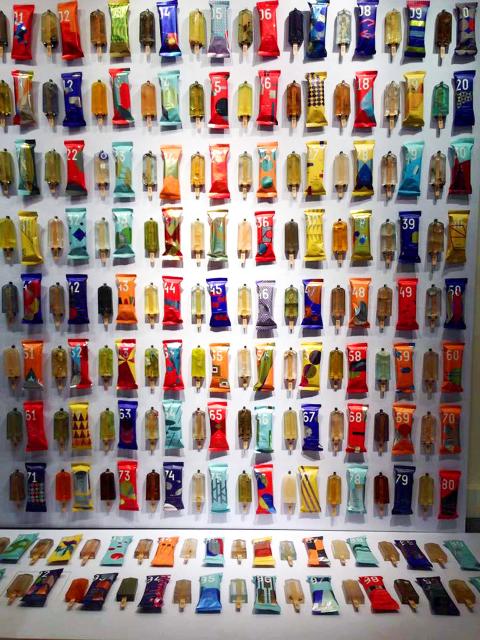Three young artists have made popsicles using water from 100 polluted sources across the nation to draw attention to the degradation of the nation’s water sources.
The “Polluted Water Popsicle Factory” organized by National Taiwan University of Arts visual design students, aims to draw attention to the degradation of the environment by creating a contrast between visual and psychological information, artist Hung Yi-chen (洪亦辰) said.
The trio on Wednesday uploaded a video featuring the popsicles on its Facebook page, after which the number of the group’s followers surged from 7,000 to 11,000, Hung said.

Photo: CNA, provided by the Polluted Water Popsicles Factory
The water samples were taken from sewage drains, rivers, harbors and wastewater pipes around the nation and were slow-frozen into popsicles, each with its own, individually designed wrapper, Hung said.
The water was collected from sampling locations used by water resource bureaus, she said, adding that they numbered the popsicles by sampling location from the north to the south.
Previous campaigns using posters have failed to raise public awareness and the group believes that using visual and psychological tactics to shock the audience might work better, Hung said.
“The stench of popsicle No. 1 from Keelung Harbor was the worst and it left a greasy coat on the bottle. The night market ditches are also pretty gross. A popsicle made from a ditch in Yunlin County was full of bugs, but water from Taitung County’s Chihshang (池上) was comparatively clean,” she said.
The artists experimented by giving popsicles to their classmates, who thought they looked pretty and delicious, but after they were told that they were made of dirty water, they threw them away, she said.
A yellow popsicle Hung showed reporters was made from water infested by the eggs of channeled applesnail, considered one of the world’s worst invasive species by international conservation groups.
Taipei World Trade Center, Exhibition Hall 1 is to showcase polyresin replicas of the popsicles from today through Monday.

‘DENIAL DEFENSE’: The US would increase its military presence with uncrewed ships, and submarines, while boosting defense in the Indo-Pacific, a Pete Hegseth memo said The US is reorienting its military strategy to focus primarily on deterring a potential Chinese invasion of Taiwan, a memo signed by US Secretary of Defense Pete Hegseth showed. The memo also called on Taiwan to increase its defense spending. The document, known as the “Interim National Defense Strategic Guidance,” was distributed this month and detailed the national defense plans of US President Donald Trump’s administration, an article in the Washington Post said on Saturday. It outlines how the US can prepare for a potential war with China and defend itself from threats in the “near abroad,” including Greenland and the Panama

A magnitude 4.9 earthquake struck off Tainan at 11:47am today, the Central Weather Administration (CWA) said. The hypocenter was 32.3km northeast of Tainan City Hall at a depth of 7.3km, CWA data showed. The intensity of the quake, which gauges the actual effect of a seismic event, measured 4 in Tainan and Chiayi County on Taiwan's seven-tier intensity scale, the data showed. The quake had an intensity of 3 in Chiayi City and County, and Yunlin County, while it was measured as 2 in Kaohsiung, Nantou County, Changhua County, Taitung County and offshore Penghu County, the data showed. There were no immediate reports of

The Chinese Nationalist Party (KMT) is maintaining close ties with Beijing, the Democratic Progressive Party (DPP) said yesterday, hours after a new round of Chinese military drills in the Taiwan Strait began. Political parties in a democracy have a responsibility to be loyal to the nation and defend its sovereignty, DPP spokesman Justin Wu (吳崢) told a news conference in Taipei. His comments came hours after Beijing announced via Chinese state media that the Chinese People’s Liberation Army’s Eastern Theater Command was holding large-scale drills simulating a multi-pronged attack on Taiwan. Contrary to the KMT’s claims that it is staunchly anti-communist, KMT Deputy

RESPONSE: The government would investigate incidents of Taiwanese entertainers in China promoting CCP propaganda online in contravention of the law, the source said Taiwanese entertainers living in China who are found to have contravened cross-strait regulations or collaborated with the Chinese Communist Party (CCP) could be subject to fines, a source said on Sunday. Several Taiwanese entertainers have posted on the social media platform Sina Weibo saying that Taiwan “must be returned” to China, and sharing news articles from Chinese state media. In response, the Mainland Affairs Council (MAC) has asked the Ministry of Culture to investigate whether the entertainers had contravened any laws, and asked for them to be questioned upon their return to Taiwan, an official familiar with the matter said. To curb repeated